 Petzlover
Petzlover Both American Shorthair and Serengeti are originated from United States. Both American Shorthair and Serengeti are of same weight. American Shorthair may live 5 years more than Serengeti. Both American Shorthair and Serengeti has same litter size. Both American Shorthair and Serengeti requires Low Maintenance.
Both American Shorthair and Serengeti are originated from United States. Both American Shorthair and Serengeti are of same weight. American Shorthair may live 5 years more than Serengeti. Both American Shorthair and Serengeti has same litter size. Both American Shorthair and Serengeti requires Low Maintenance.
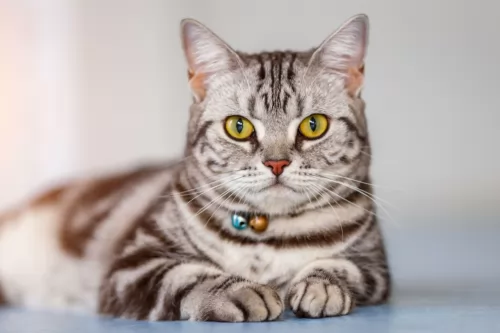 Often sailors of old would keep cats onboard to protect their stores from mice and rats, and so it was when settlers sailed from Europe to North America.
Often sailors of old would keep cats onboard to protect their stores from mice and rats, and so it was when settlers sailed from Europe to North America.
They had cats onboard and once onshore they interbred. But in the 20th century, a selective breeding program began to bring out the best qualities of these cats.
The American Shorthair is one of these cats – a pedigreed cat that is accepted by all North American cat registries. At first, the cat was known as the Domestic Shorthair but it was renamed in 1966.
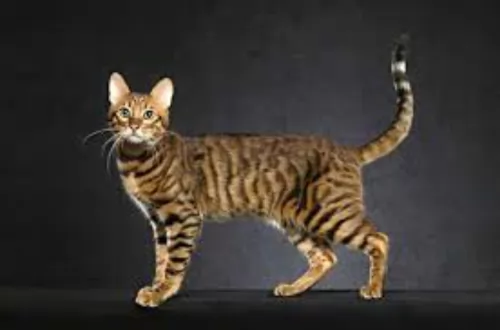 This is a cat breed that was deliberately bred to resemble the Serval cat. It was developed by crossing a Bengal cat and an Oriental Shorthair.
This is a cat breed that was deliberately bred to resemble the Serval cat. It was developed by crossing a Bengal cat and an Oriental Shorthair.
The cat was developed by biologist Karen Sausman in California in 1994. The breed is still under development.
The idea with this hybrid cat was to produce new domestic cat breed that would look like a wild cat but not have the wild characteristics.
The cat is recognized by TICA – The International Cat Association.
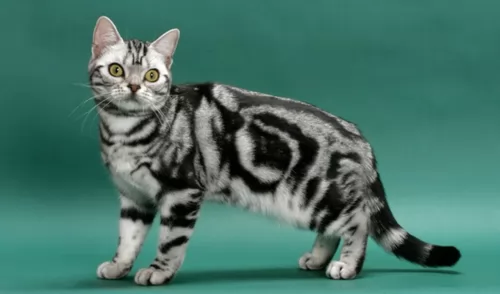 The American Shorthair is a large, sturdy cat with a round face and short ears. Their coats can come in many different patterns and colors. They shed so the fur will need to be brushed from time to time.
The American Shorthair is a large, sturdy cat with a round face and short ears. Their coats can come in many different patterns and colors. They shed so the fur will need to be brushed from time to time.
They stand at about 20 – 25cm in height and they weigh between 5 and 7kg.
The American Shorthairs are easy, no-fuss cats. They’re also low maintenance, healthy, amicable cats, ready to even be friends with strangers and your dogs.
He is an intelligent cat too so it will be important to provide him with toys that challenge him to think. These good-natured cats make perfect famiy companions.
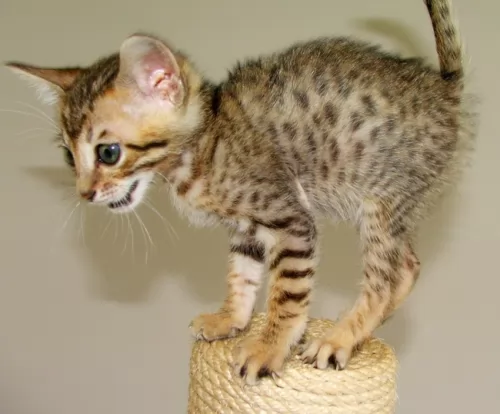 These are spotted cats with long legs and large, round-tipped ears. The neck is long and the body lithe, lean, and muscular.
These are spotted cats with long legs and large, round-tipped ears. The neck is long and the body lithe, lean, and muscular.
They are medium to large in size and can weigh up to 7 or 8kg. The coat is tan and cream with silver or grey coloring as well as black spots and stripes. Some Serengetis appear to be black but on closer look, you see that they have what is known as ‘ghost spotting’ – a black-spotted pattern that can scarcely be seen.
You may even think you are looking at a black panther. The coat is short, silky, smooth, and sleek. The eyes of the cat are round and are usually amber or gold.
The Serengeti is a friendly, social, and confident cat that is quite capable of forming a strong attachment to its human family. It is a loving, loyal cat. The cat can become bored and will need plenty of puzzle toys to keep his mind and body physically active.
You will need to provide him with a scratching post too as he is a lively, energetic cat. This isn’t only an indoor cat. Cats like the Serengeti will need an outdoor enclosure and the Serengeti cat will need branches and perches to leap up onto.
He is an active cat and can become bored if left indoors. They are capable of making a good family pet and are vocal too – telling you all sorts of things.
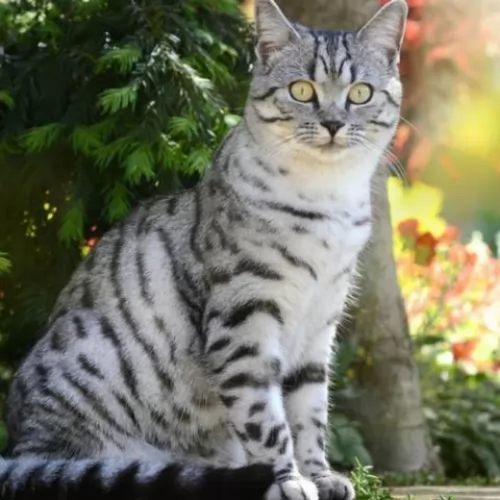 The American Shorthair is a playful cat and is quite capable of amusing himself, but will welcome your games too. He’s a big cat so make sure he gets enough exercise to avoid him becoming obese.
The American Shorthair is a playful cat and is quite capable of amusing himself, but will welcome your games too. He’s a big cat so make sure he gets enough exercise to avoid him becoming obese.
He is a low maintenance cat and you don't have to be worrying about him too much as he just likes to get on with life. He loves being well-fed, getting your attention and lying in the sun.
This is one cat that doesn’t need a lot of attention so being easy to care for, independent, playful, and affectionate, you’re going to have one of a kind companion and friend.
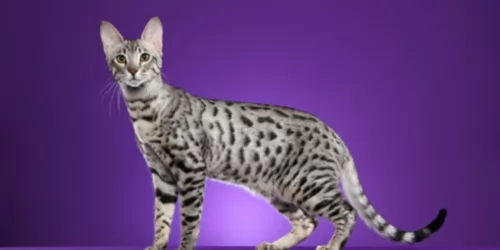 The Serengeti is both a friendly and affectionate cat even though he is a bit shy and overwhelmed in new surroundings.
The Serengeti is both a friendly and affectionate cat even though he is a bit shy and overwhelmed in new surroundings.
He is a cat that talks quite a bit and if he is happy and content he enjoys 'chatting' to you about his day.
He is able to get on well with children in the home as well as with other pets. He is an athletic cat and just loves to climb, and this is why he will certainly need an outdoor enclosure as he loves to dart around madly from time to time, and doing that in your home could be quite dangerous.
He is capable of being a loving cat breed and can form a strong bond with his human family.
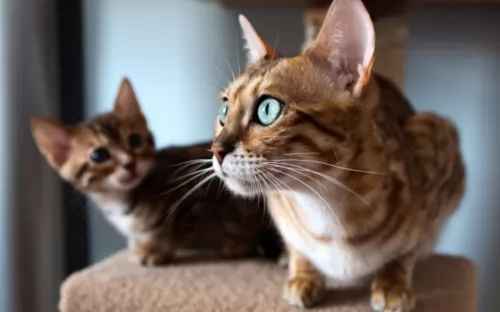 Hybrid Cats such as the Serengeti are a combination of a wild breed and a domestic breed. With good care he can live to be up to 15 years of age and possibly longer.
Hybrid Cats such as the Serengeti are a combination of a wild breed and a domestic breed. With good care he can live to be up to 15 years of age and possibly longer.
Hybrid cats are always controversial because people who have owned them have got both good and bad to say about them. They have some behavioral issues and many of them have an aggressive side, they’re aloof and they refuse to use a litter box. The cat can’t be blamed though because they have that wild side.
They also come with some health issues such as premature birth, miscarriage, diarrhea, and irritable bowel disease. You may just find yourself more often at the vet than you’d like.
You will need to ensure that your Serengeti gets all his vaccines and de-worming treatments.
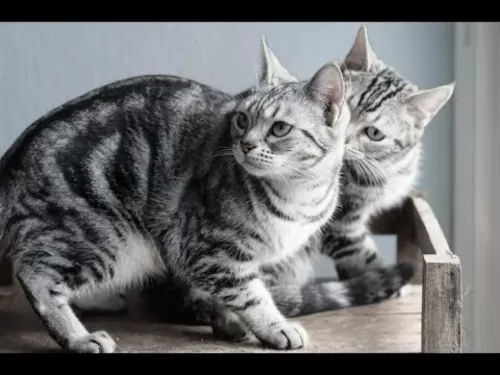 Your American Shorthair will benefit greatly from regular brushing and he looks forward to this grooming period and being pampered by you for a few minutes.
Your American Shorthair will benefit greatly from regular brushing and he looks forward to this grooming period and being pampered by you for a few minutes.
It helps to remove the dead hair from his coat and this is important so that he doesn’t ingest the loose hair. While you’re brushing him, you can also run your fingers over him to make sure there are no unusual lumps. Anything odd or any sign of illness you should take your cat to see the vet immediately.
Make sure your American Shorthair has access to the best quality food there is. There are many commercially manufactured cat foods available and your vet can advise you on the best one to choose.
Cats are carnivores so aways choose food that is high in proten. Food must be provided in accordance with the cat’s age and energy levels. Certainly a generic cat or one with a medical condition will need a certain type of food than a young, frisky kitten. Make sure your cat always has access to fresh, cool water.
Make sure your furry feline friend has everything he needs to ensure he is comfortable. This includes feeding bowls, toys, a litter box, soft bedding, nutritious food as well as scratching post and climbing equipment.
Have your pet neutered or spayed if you don’t want kittens from your cat. These procedures have enormous health benefits for your pet and it prevents even more kittens coming into a world that already has far too many unwanted pets.
Make sure your cat is up to date with all his vaccines because without being vaccinated your cat can succumb to any one of the life-threatening cat illnesses there are. Kittens need to have their first vaccines at 8 weeks of age.
If you have to take your cat to the vet you need a carrier basket so that your cat feels comfortable and safe inside it.
You can’t just put your cat on a leash and take him to the vet as inside the car he will lurch around and cause you to lose attention. A transport box that is familiar to your cat will be the best way for you and your cat to travel.
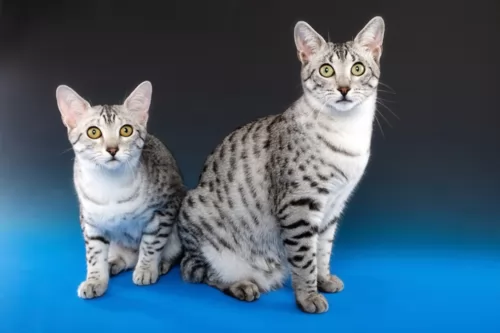 Grooming is easy for the Serengeti as it is a short-haired cat and will require a brush just once a week. Trimming the claws will also be necessary.
Grooming is easy for the Serengeti as it is a short-haired cat and will require a brush just once a week. Trimming the claws will also be necessary.
A cat such as the Serengeti has been developed by crossing the domestic cat with a wild breed. This means that there will be concerns with the temperament and behavior of these cats in a home setting. Apart from being allowed indoors, they will need an outside enclosure.
Having a wild side, while every cat is a carnivore, these cats are even more so. Their diet has to be strictly protein – meat. Wild cats would have a diet made up of birds and lizards. You want to avoid commercial cat foods that are of lower quality and have less meat in and more carbohydrates. This just spells ill health for your cat. Cats also need some fresh raw meat in their diets.
It is important to keep up your Serengeti's veterinary checkups to make sure there aren’t any health concerns.